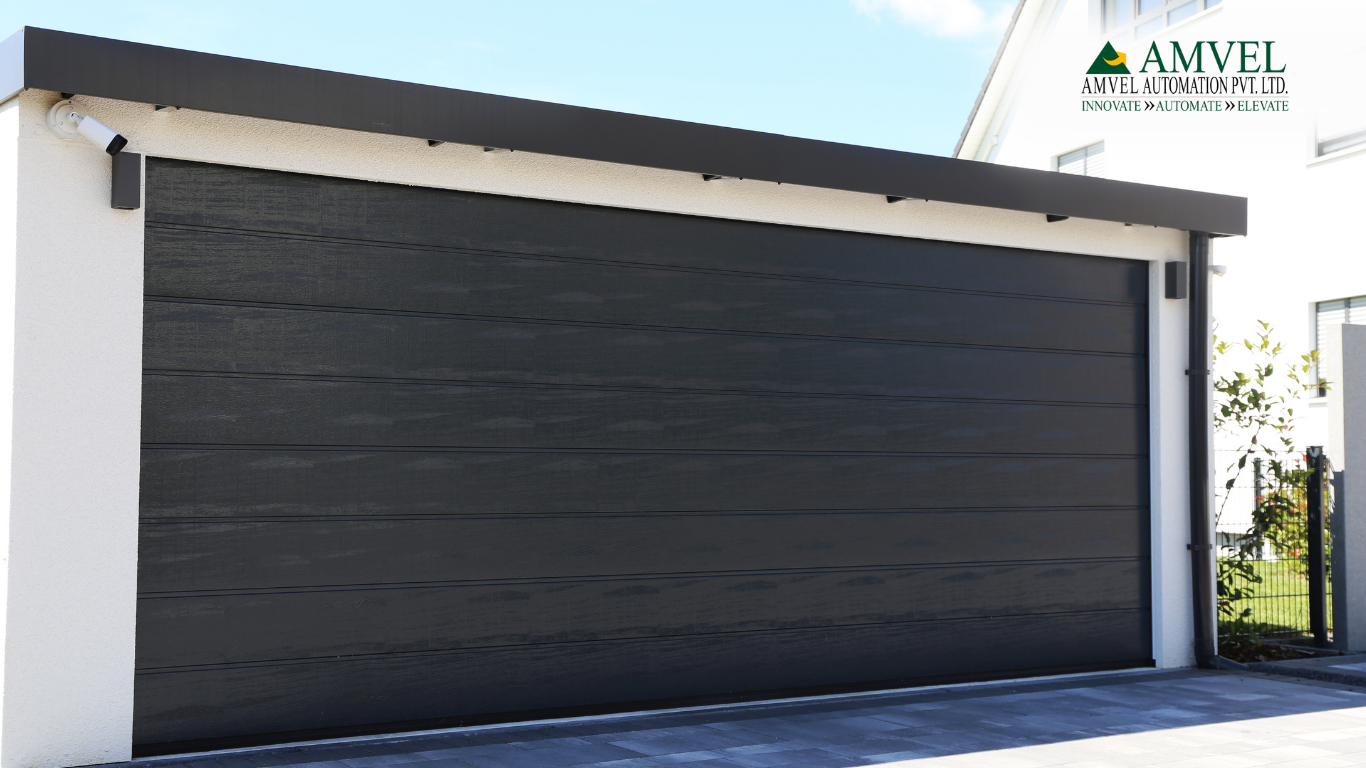Table of Contents
ToggleThis guide helps you to get into the key aspects of choosing a manufacturer, empowering you to obtain a durable, safe, and cost-effective solution for your industrial requirements.
What Are Industrial Doors?
Industrial doors are engineered to meet the rigorous demands of manufacturing units, warehouses, and other industrial environments. In contrast to conventional doors, they are meticulously designed to endure intensive usage and challenging conditions.
Types of Industrial Doors (With Automation Features)
1. Rolling Shutters
- Description: Space-saving doors that roll up into a coil. These can be automated for easy and efficient operation.
- Automation Features: Can be fitted with motorized systems for automated opening and closing.
- Applications: Ideal for areas where space is limited, such as warehouses, factories, and storage units.
2. High-Speed Doors
- Description: Doors designed to open and close at high speeds, crucial for maintaining controlled environments.
- Automation Features: Fully automated with motion sensors or remote control systems for fast and smooth operation.
- Applications: Perfect for temperature-controlled environments like cold storage, food processing plants, and pharmaceuticals.
3. Sectional Overhead Doors
- Description: These doors consist of multiple horizontal panels that lift vertically and slide overhead. They can be customized to fit specific size requirements.
- Automation Features: Can be integrated with motorized opening mechanisms, sensors, and smart controllers.
- Applications: Suitable for large commercial buildings, logistics centers, and warehouses.
4. High-Speed Performance Doors
- Description: Designed for high-performance industries that prioritize safety, speed, and low maintenance.
- Automation Features: Fully automated for fast cycles, equipped with safety sensors and minimal maintenance features.
- Applications: Industries like automotive, steel manufacturing, pharmaceuticals, and food processing.
5. Roll-Up Doors
- Description: Doors that roll up into a compact coil, providing space efficiency and durability.
- Automation Features: Can be motorized for quick and efficient roll-up/down actions.
- Variants:
- Standard Sturdy: Durable for everyday industrial use.
- Airtight Clean Room: Specially designed for airtight environments.
- High Wind Pressure Resistant: Built to withstand strong winds in exposed or coastal locations.
- Special Applications: Customized for specific industry needs with automation options.
6. Folding Doors
- Description: These doors fold or slide to open, making them ideal for large spaces.
- Automation Features: Motorized folding systems allow for smooth automated operation.
- Variants:
- Fold-Up Hangers: Ideal for large hangers or industrial buildings requiring wide openings.
- Sliding Folding: Efficient for industrial sites needing space-saving, automated sliding mechanisms.
7. Spiral Doors
- Description: Doors that operate at ultra-fast speeds, utilizing a spiral track for opening and closing.
- Automation Features: Fully automated with ultra-speed motion and high-tech safety features.
- Variants:
- Ultra Speed Spiral: Designed for industries requiring rapid door cycles.
- Ultra Speed Clean Room: Ensures fast, clean access for sterile environments like laboratories.
8. Insulated Sectional Doors
- Description: Doors that provide insulation for temperature-sensitive environments.
- Automation Features: Automated systems ensure seamless operation while maintaining insulation properties.
- Variants:
- Normal Sectional Doors: Insulated doors that provide temperature control.
- Full Vision Sectional Doors: Incorporates large windows for visibility with motorized opening features.
9. Automatic Sliding Doors
- Description: Automated doors that slide open horizontally, ensuring easy access without occupying floor space.
- Automation Features: Motion sensors or remote controls for seamless operation.
- Applications: Frequently used in factories, commercial buildings, and industrial environments where hands-free access is needed.
Why It’s Important to Choose the Right Industrial Door Manufacturer
Quality and Durability
The longevity of industrial doors is entirely linked to their quality. Choosing a high-quality door from a reputable manufacturer not only ensures a longer lifespan but also minimizes long-term maintenance expenses. Hence, investing in a reliable manufacturer becomes paramount for cost-effectiveness.
Safety Standards
In industrial environments, safety is an essential criteria. A trustworthy manufacturer will produce doors that adhere to safety regulations, instilling confidence in business owners and safeguarding employees’ well-being.
Customization Options
Every industrial setup has unique needs. The ability to customize doors ensures they meet the specific requirements of your facility, whether it’s size, material, or functionality.
Key Factors to Consider When Choosing an Industrial Door Manufacturer
Experience and Expertise
Experience speaks volumes. Manufacturers with a long history in the industry are likely to have refined their production processes, resulting in better products.
Product Range
A manufacturer with a diverse product range can cater to various needs, from rolling shutters to high-speed doors, ensuring you find the right solution.
Manufacturing Process
Modern technology can enhance the durability and efficiency of industrial doors. Understanding the manufacturing process can give insights into the quality of the end product.
Certifications and Compliance
Look for manufacturers who hold certifications like ISO. These certifications indicate adherence to international standards, which can be a good indicator of quality.
Customer Support and After-Sales Service
Reliable after-sales service ensures that your doors remain in optimal condition, providing you with support in case of any issues or maintenance needs.
Top Qualities of a Reliable Industrial Door Manufacturer
Reputation in the Market
Check online reviews and seek feedback from existing clients to gauge the reputation of the manufacturer. Positive testimonials can provide insights into the company’s reliability.
Pricing and Affordability
While price is a key factor, it’s important to balance cost with quality. The cheapest option might not always be the best in the long run.
Delivery Time and Installation
Timely delivery and professional installation are crucial to minimize disruptions to your business operations. Make sure the manufacturer can meet your timeline.
Warranty and Guarantees
A good manufacturer will offer warranties on their products, providing assurance against defects and guaranteeing durability.
Comparing Local vs. National Manufacturers
Benefits of Local Manufacturers
Local manufacturers often provide faster delivery and personalized customer service. They are also more familiar with regional regulations and standards.
Advantages of National Brands
National brands typically have a wider range of products and more advanced manufacturing capabilities. They might be better equipped to handle large orders and customizations.
Which Option Is Right for Your Business?
Your decision should depend on factors like the size of your project, budget, and the level of customization you require.
Questions to Ask Potential Industrial Door Manufacturers
About Their Product Range
Make sure they offer the type of industrial door you need. This ensures compatibility with your operational requirements.
Customization Capabilities
Ask about their ability to customize doors to fit specific dimensions, colors, or features that match your industry needs.
Warranty and Maintenance Services
Understanding their warranty policies and maintenance services can help you avoid unexpected costs in the future.
Common Mistakes to Avoid When Choosing an Industrial Door Manufacturer
Focusing Only on Price
While it’s tempting to choose the cheapest option, focusing solely on price can lead to compromises in quality and durability.
Ignoring Reviews and References
Skipping this step can be a costly mistake. Always check reviews and ask for references to ensure you’re making an informed decision.
Not Considering Long-Term Needs
Consider your long-term needs, such as future expansions or changes in operation. This can save you from having to replace doors prematurely.
How to Get the Best Value for Your Investment
Negotiating Contracts
Discussing terms and conditions upfront can help you secure better rates and favorable terms.
Bundling Services for Discounts
Many manufacturers offer discounts if you purchase multiple products or services together. This can be a great way to save on costs.
Choosing Energy-Efficient Doors
Energy-efficient doors can significantly reduce heating and cooling costs, offering savings in the long run.
Conclusion
Choosing the best industrial door manufacturer in India requires a blend of research, careful consideration of your needs, and a focus on quality. By evaluating factors like experience, product range, and customer support, you can make an informed decision that ensures safety, durability, and value for your investment. Amvel Automation, a reliable industrial door manufacturer in India, provides high-quality, customizable solutions that meet safety standards. Our experience, dedicated service, and range of options make us a trusted partner for industries seeking efficiency and security through advanced door systems. Choosing Amvel Automation ensures durable doors and a seamless experience aligned with long-term operational goals.
Frequently Asked Questions
1.What is the best type of industrial door for a warehouse?
Rolling shutters and sectional overhead doors are often best for warehouses due to their durability and space-saving design.
2.How much should I expect to spend on industrial doors?
The cost varies depending on the type and size of the door, but it’s essential to balance affordability with quality.
3.How often do industrial doors need maintenance?
Regular maintenance every 6-12 months is recommended to ensure smooth operation and longevity.
4.What are the most important certifications for industrial doors?
ISO certifications and compliance with local safety regulations are key indicators of quality.
5.How long does it take to install an industrial door?
Installation time varies but typically ranges from a few hours to a few days, depending on the door type and site conditions.



